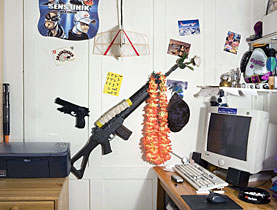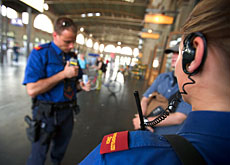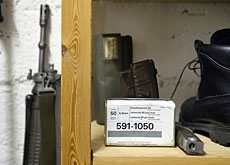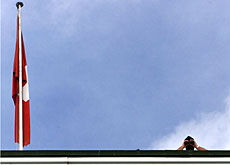Army tradition loses more ground

The long-standing tradition of keeping army weapons at home is increasingly losing support among the population, security experts say.
An overwhelming majority of Swiss feel secure and trust the army, police and justice authorities, according to the 2008 Security Study of the Federal Institute of Technology in Zurich.
Thirty-four per cent of respondents said they were in favour of maintaining the tradition of keeping the standard issue military weapon at home.
Support for the tradition has been on the decrease over the past 20 years, from 57 per cent in 1989 to 46 per cent in 2004.
The percentage against was particularly high among women and young people. But the study found that there was no longer a majority among men of all age groups in favour of keeping army rifles and pistols at home.
“There is also a clear trend among the older generation to oppose army weapons at home,” the authors of the report said.
The researchers said women and youths were more critical of the tradition because they are more often victims of domestic violence.
Army-issue weapons are said to be involved in the deaths of more than 300 people in Switzerland every year.
Estimations of the number of firearms in circulation in Switzerland range upwards from 1.2 million.
Confirmation
The findings of the latest Security Report appear to confirm previous polls on the subject. A survey by a suicide prevention group, Ipsilon, published in 2007, said two in three citizens were in favour of banning army weapons from the home.
A year ago parliament approved a compromise proposal to ban army ammunition at home for most militia soldiers, despite opposition by the members of the rightwing Swiss People’s Party.
However, the defence ministry defended the practice of storing army guns in private households.
The decision by parliament came as pacifist organisations and the centre-left Social Democratic Party were collecting the necessary signatures for a nationwide vote on the issue.
All able-bodied Swiss men aged 20-30 are conscripted for about three months and issued with a rifle.
After initial training, they are required to do three or four weeks of army service a year until they have served a total of 260 days or reached the age of 34. Throughout this time they keep their rifles and 50 rounds of ammunition at home.
Seven years ago a gunman shot and killed 14 people in a local parliament in central Switzerland, before turning the rifle on himself.
Debate on the use of firearms was further fuelled when the husband of former women’s ski champion Corinne Rey-Bellet killed his wife and her brother with his army pistol.
swissinfo with agencies
The study has been published by Zurich’s Federal Institute of Technology (ETH) on an annual basis since 1999.
1,200 people from across the country were surveyed in January this year.
The Center for Security Studies (CSS) is an academic institute specialised in research, teaching, and the provision of services in international and national security policy.
The survey covers several aspects of security: trust in institutions, such as the armed forces, courts, police and the government, as well as cooperation with the UN, EU and Nato.
As in previous years, a large majority of Swiss feel “very” or “rather” safe. The figure went up to 90% in 2008 from 86% in 2007.
79% are optimistic about Switzerland’s future – unchanged from 2007. The optimism is reflected in increased trust in the Swiss economy.
69% of respondents said it is necessary for Switzerland to have an army, up 8% on the previous year.
49% came out against the purchase of new fighter jets for the air force, while 42% were for the acquisition.
The Swiss continue to be strong believers in the principle of neutrality. The figure reached a record 93% (+1%).

In compliance with the JTI standards
More: SWI swissinfo.ch certified by the Journalism Trust Initiative



You can find an overview of ongoing debates with our journalists here. Please join us!
If you want to start a conversation about a topic raised in this article or want to report factual errors, email us at english@swissinfo.ch.